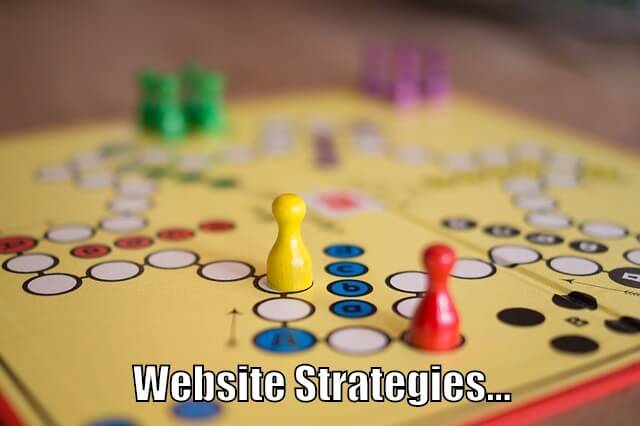 These 3 website strategies for beginners are just the tip of the iceberg…
These 3 website strategies for beginners are just the tip of the iceberg…
There are literally hundreds of others out there but I’m limiting the choices to just the basics for beginners and only focusing on three relatively easy website strategies.
What are your website goals and objectives?
Consider this a friendly warning…
Before you go spending a cent on domain names, hosting, website development, or web design; understand what your website goals and objectives are?
Do some research and find a good website planning guide on Amazon or on the web.
Not understanding what your expectations are upfront will lead you to unexpected costs and rework.
Worst case, a good domain name could be permanently damaged by being blacklisted and de-indexed by search engines because of risky SEO tactics.
Two years ago just about anything was OK…
…but that doesn’t work anymore and you need to tread carefully not to get rushed into risky SEO practices.
Take your time planning!
Start with the Safe Basics and Progress…
Each strategy is designed to take into consideration the current challenges and risks that exist in driving traffic to a webpage or building a following of happy readers or customers who want what you have to offer as a service or for information.
Website Strategy #1 (the basic website)
This strategy doesn’t waste your time on anything more than an information webpage.
What is an information webpage?
It’s a cleanly built website that provides the basic information for how to contact your business, what your services are, who you are – maybe 5 or 6 pages at most:
- home page
- about page
- contact page
- services you offer
- and testimonies
- include any legal requirements
How to use it?
Once created, you put your website URL on your business cards, in your chamber of commerce profile, and in all your advertisements.
This basic website strategy is kept very simple and directs customers to your site via direct traffic from the URL.
What this strategy is not meant to do is get you a lot of search traffic.
Sorry but that’s much more difficult than just putting up a website because too many businesses are competing for the same keywords and phrases with you.
And unless you are ready to spend much more in time and money, this basic website strategy is a good starting place.
Website Strategy #2 (adding a blog and content)
The next Website Strategies for Beginners takes the basic strategy up just a notch and add adds a blog.
What is a blog?
A blog and allows you to post articles about your craft on the website.
For example:
If you are a bicycle repair shop in Phoenix Arizona, and you have a unique specialty in mountain bikes, then you can write about it on your blog and build an audience of mountain bike riders who have an interest and are looking for what you specialize in.
The strategy here is to target your blog content to the brands or crafts you offer. This will lure readers and shoppers to your post via organic search on the keywords or paid advertising (PPC).
In this strategy, you also want to be very specific in your article writing to target the local community of your business and the surrounding area.
In my example, I give Phoenix Arizona, but you should get even more specific in your article with location, bike types, terrain, tires, seats, models, makes, etc.
Describe the bike and location with every bit of detail that anyone searching for it on Google would use.
Also make the article read like a how-to or an epic experience, and include photos.
What this website strategy does is draw in readers who have an interest in your specific craft and are located in the same GEO location. The key is to be genuine and passionate.
It’s a simple strategy for beginners without a lot of whistles and bells, and it works to a certain extent in building leads and authority.
What is Authority? Authority is the level of trust or respect people visiting your website feel you have. The higher the authority the more they are to share your links and articles with others or talk about you on their websites or social networks. Authority is not tangible, but you know when you have it because you will get more attention.
Website Strategy #3 (advanced blogging and content strategy)
This strategy takes it up yet another notch and goes into content marketing and search engine optimization (SEO)…
…and I will admit it is not cheap nor is it fast, and there may not be any real value except higher listings on Google search results (SERPs).
Next Notch…
By the time you have followed strategies 1 & 2, you may be hooked on the new craft you learned of content writing…
…and interaction with people who comment on your posts or customers who find you entertaining.
They may even start “Tweeting” your links and “Liking” you on Facebook.
This is all great and is free advertising once it does start happening…but unfortunately that isn’t always the case because everyone is not the social type.
What I mean is maybe you just want an easy-going life and don’t need all the attention. If that’s the case don’t go beyond strategy two, and you will be fine as long as you keep adding new posts to your blog.
But if you crave excitement and need the rush of followers, Tweets, and Likes, then promoting your blog becomes the next step.
Building your authority as the best mountain bike service provider in the southwest is the goal of your website.
It’s time to start scaling your content and adding reviews of this bike versus that bike, or these mountain bike tires versus those tires.
These review articles need pictures, Pros and Cons, testimonials, and technical details.
Also, keep your content fresh and blog about the trends of the day(the now). Don’t waste your words on the past, focus on what’s hot now and trending for tomorrow.
Use as many new (current) keyword terms as you can fit into your article without it turning into spam. Be specific with models, brands, specifications, etc…but don’t go overboard repeating the same stuff in the same article.
Also by this time, you’ll need to understand SEO and how to write metadata and post descriptions.
And what keywords density is so you are not rambling on using the same words over and over which will get you penalized by Google for spamming your content.
Finally, understand how to use on-page SEO* because it is important so you can build links within your website that direct readers to other content you’ve written on similar topics.
*All this is more on the technical side which is not what this post is intended for but do your research and learn it if you intend to move beyond strategy three.
Summary
So we have covered 3 website strategies for beginners who want to start a personal or business website.
As you may have noticed what I am not covering is anything social and paying for services because there are too many choices once you open that can of worms.
These 3 website strategies are for beginners and will be a good starting place.


